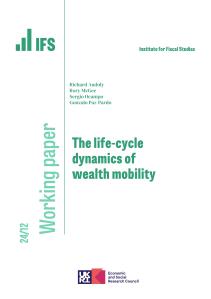
Recent decades have seen rising wealth-to-income ratios. In England, increases in wealth have been concentrated among older generations.
Listen now: Apple Podcasts | Spotify | YouTube | Acast | Google Podcasts | Stitcher | RSS
Recent decades have seen rising wealth-to-income ratios. In England, increases in wealth have been concentrated among older generations.
Those born in the 1980s have accumulated no more wealth than those born in the 1970s had done by the same age, but the parents of those born in the 1980s hold 40% more wealth than the parents of those born in the 1970s held at the same age. One consequence is that inherited wealth is on course to be a much more important determinant of lifetime resources for today’s young than it was for previous generations.
In this episode we speak to James Banks, Professor of Economics at the University of Manchester and Senior Research Fellow at IFS, and David Sturrock, Senior Research Economist.
Related content
Host

Director
Paul has been the Director of the IFS since 2011. He is also currently visiting professor in the Department of Economics at University College London.
Participants

CPP Co-Director
James is Senior Research Fellow and Professor of Economics at Manchester, working on broad issues in the economics of retirement, savings and health.

Senior Research Economist
David’s research covers household wealth, intergenerational transfers, social mobility, pensions taxation, and health and work at older ages.
Podcast details
- Publisher
- IFS
More from IFS
Understand this issue

Why inheritance tax should be reformed
18 January 2024

Raising revenue from closing inheritance tax loopholes
18 April 2024

Sure Start achieved its aims, then we threw it away
15 April 2024
Policy analysis

Living standards since the last election
21 March 2024

Major challenges for education in Wales
21 March 2024

Sliding education results and high inequalities should prompt big rethink in Welsh education policy
21 March 2024
Academic research

The life-cycle dynamics of wealth mobility
10 April 2024

Labour market inequality and the changing life cycle profile of male and female wages
15 April 2024

There and back again: women’s marginal commuting costs
2 April 2024